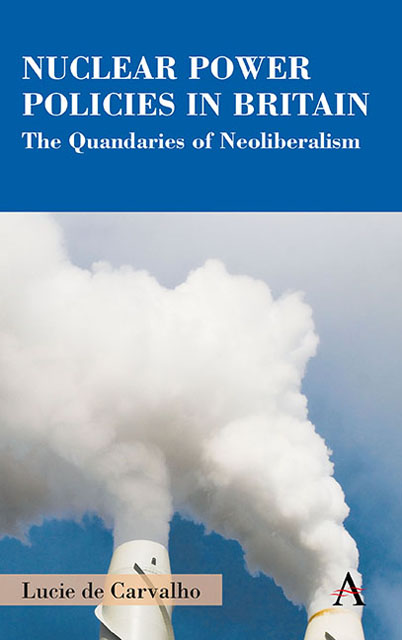Chapter Three - The UK Nuclear Renaissance: Towards a New Paradigm for Experts/Citizens/Politics Relations
Published online by Cambridge University Press: 10 January 2023
Summary
After having explored the factors which presided over British nuclear decisions between 1979 and the mid-2010s, the next step is to turn to the decision-making process per se and look into the way technical decisions were debated and elaborated. The current theoretical consensus around governance holds that the 1990s have been characterised by a transfer of power from the institutional centre to the civil society through a new political balance conceptualised as ‘participatory democracy’. A manifestation of neoliberal governance, participatory democracy was grounded in the defence of citizens’ freedom of choice and empowerment, which was framed as an ideological reaction to address the prevailing popular crisis in confidence towards politics. This conceptual framework quickly attracted political and academic interest by the early 2000s, especially in the fields of risk analysis, political communication, political or social sciences. It was framed as a means to shore up democratic capital especially for controversial public policies. According to its intellectual and political advocates, participatory democracy also eroded the state's command and control capabilities and helped approach political deliberation more horizontally. Theory was translated into several political attempts at improving citizens’ participation in the decision-making process through public inquiries, public consultations or citizens’ juries, for instance. These initiatives were at first favourably welcomed and praised by many. They were seen as innovative means to ward off a general rise in political apathy and scepticism regarding political efficiency to eventually open a new age of transparency and rejuvenated accountability in British politics. New adjectives such as ‘pluralistic’, ‘discursive’, ‘interactive’, ‘deliberative’ or ‘reflexive’ blossomed, to be associated with a potential democratisation of public policy.
These participatory devices or instruments were thus introduced in science and technology policy areas as a means to acknowledge what social scientists had been advocating since the early 1980s, namely that technological choices are not fundamentally technical in nature but are value-laden and as such, should be submitted to public scrutiny and appreciation. These democratic experiments resembled a rekindled interest in consensusbuilding around decisions which are not only technically feasible or economically attractive but also socially acceptable. Too often modelised as a linear process based on rational and scientific assessments, policymaking then emerged as a constellation of various vested interests, values, actors and emotions vying, interacting or colliding.
- Type
- Chapter
- Information
- Nuclear Power Policies in BritainThe Quandaries of Neoliberalism, pp. 81 - 112Publisher: Anthem PressPrint publication year: 2022

